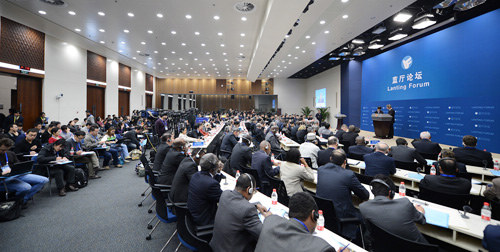|
 |
|
FOREIGN POLICY POWWOW: Some 300 representatives including ambassadors, scholars, businesspeople and journalists attend the Eighth Lanting Forum hosted by China's Foreign Ministry in Beijing on December 28, 2012 (LI XIN) |
In the global village of today's world, the prosperity of a few countries cannot rest upon other nations' poverty. Not even the most powerful country can ensure its security without respecting and accommodating other countries' security interests. With its basic foreign policy principles firmly in place, China seeks to strengthen its international relations as it develops in the midst of a changing global situation.
Promoting peace and stability
At the Eighth Lanting Forum of the Ministry of Foreign Affairs on December 28, 2012, Chinese Vice Foreign Minister Zhang Zhijun pointed out that China's overall foreign policy will not change.
Initiated in December 2010, the Lanting (Blue Hall) Forum serves as a platform for communication between the Chinese Government, the business community, academia, media and the public with a focus on China's foreign policy.
To seek one's own development, it is essential that others have a chance to develop as well, said Zhang. "To ensure one's own safety, it is important that others feel safe, too. When one becomes prosperous, others should become successful together. This is what China believes in and what it strives for," said Zhang.
Zhang reiterated that China will shoulder more responsibilities when dealing with international affairs. "China will take a more active part in international affairs," he said. "This will greatly boost the international response to global challenges and help make the international order and system more just and equitable," he added. Meanwhile, Zhang stressed China advocates the peaceful settlement of international disputes and regional hotspot issues and works vigorously to that end.
Qu Xing, President of the China Institute of International Studies, said being the largest developing country in the world gives China a unique viewpoint when dealing with international events.
He noted China is still a developing country in spite of its influential power and emerging economy, stressing that China will require more efforts in developing urbanization, the service sector and education while increasing science and technology research.
China objects to military intervention against a sovereignty state, he said. "History and facts have proved that war and force can never solve problems." China has been maintaining contacts with all related parties in Syria, trying to persuade all of them to settle the current chaos through peaceful negotiations. Moreover, China doesn't believe sanctions will be able to solve nuclear issues. China insists on non-proliferation, and it respects any country's lawful right of peacefully using nuclear energy while obeying the Treaty on the Non-Proliferation of Nuclear Weapons, he added.
China's rapid economic development will continue to inject dynamic growth to the world economy. It is estimated that during the 12th Five-Year Plan period (2011-15), China's imports will exceed $8 trillion and its outbound investment will reach $500 billion. This will be a big driving force behind the global economy now dragging along in a sluggish recovery. "China plays the role of a stabilizer and thruster in the global economy. This is certainly a good thing for the world," Zhang stressed.
Zhang also clarified China's foreign policy in Asia. "No matter how much progress China achieves in its development, it will only strengthen its policy of promoting friendship and partnership with its neighbors. China will remain forever a good neighbor, good friend and good partner of its neighbors," Zhang said.
China shares 22,000-km land boundaries with 14 countries. It has a continental coastline stretching 18,000 km and faces eight countries across the sea.
China has maintained close high-level exchanges with its neighbors, with nearly 100 high-level visits taking place each year, which have helped enhance mutual understanding and political trust. Personnel exchanges at other levels are also vibrant. China and ASEAN have set up the largest free trade area among developing countries. Their trade soared from $50 billion in 2002 to $362.8 billion in 2011 at an average annual growth rate of 20 percent. China has become the principal trading partner of ASEAN countries and most of China's neighbors. China is also the biggest investor in many countries in the region. Over the past 10 years, China's trade with its neighbors has registered a six-fold increase, growing from $170 billion to over $1 trillion.
| 